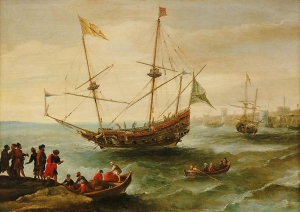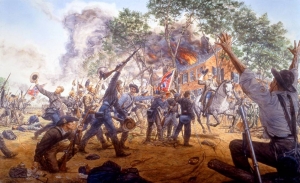A major part of the progressive mindset is the notion of a linear path of history (one might call it a “progression”). This is essentially the belief that all things today are better than all things in the past, and all things in the future will be better than all things today. Since things today
MoreSome observers have smugly claimed that it is impossible to have a reactionary movement. They say it would be like piecing a ruined cobweb back together or trying to set Humpty Dumpty back on his wall. For them, it is one item on a long list of impossibilities. If one supposes that reactionaries want to
MoreIn the film version of George Orwell’s book Keep The Aspidistra Flying, the main character, a struggling writer, assumes correctly that because a benefactor of writers is wealthy, said benefactor is therefore a communist. This assumption was very much a reality in the upper class intellectual world of 1930s Britain. For it was not only
MoreI have been asked to write a weekly column on British politics. Since I am writing for a largely American readership, and since Americans mostly know little of what happens outside their own country, I think it would be best if I were to begin with a brief overview not only of what is happening
MoreGeorge Orwell’s devastating satire on Stalinism, Animal Farm remains even 72 years later, along with Nineteen Eighty-Four, the gold standard for totalitarian literature. But Orwell’s classic novel which established the phrase “Some Animals Are More Equal Than Others” nearly didn’t secure a publisher, who based their rejections not on the quality of the book, but
MoreOmitted from leftist narratives as to why those of their own defected to the anti-Communist side is how a single murder provoked the defection. Instead pro-Communists and “anti-anti-Communists” assign base motives to these supposedly mentally unstable drunks such as a desire for the latter to line their pockets and for a new appreciation of fascism.
MoreAside from my various books–more of which will come out this month and next–I get most of my living nowadays from teaching Greek and Latin. I do this as a private tutor, and sometimes as an informal staff member at various places of education. Because demand for my services in any one place is limited,
MoreTo this day, anti-anti-communists from the Cold War period and their tenured academic counterparts scoff at the idea that Soviet communists liquidated their American agents on US soil. While grudgingly admitting that Stalin did carry out wet work against those who dared to oppose him (I’ve heard professors actually defend it), they argue that such
MoreNote: This is an exact transcript from one of the handwritten volumes of my Diary. I have kept this, with occasional lapses, since I was fifteen. It currently runs to about five million words. Most entries are of no interest to anyone else. Many are a waste of paper and ink. Some are too shocking
MoreThe story of Eastern European Jews who immigrated to America in the beginning of the twentieth century is a story of “self-marginalization.” The more dramatically Eastern European Jews progress socio-economically, the more strenuously they identify with “marginalized groups” and seek to undermine the white Christian majority population. And though he takes care to guard against
MoreOn Jun. 11, Puerto Ricans voted for the second time to become a state of the union. Could this Caribbean island actually become the 51st state of America? Other authors have written at length about the political struggles within Puerto Rico as well as the island’s serious financial sickness. I will not repeat their capable
MoreWhen radical Islamist 22-year-old Salman Abedi blew himself up at a pop music concert in Manchester, England, killing 22 and wounding 59, he did more than commit a terrorist attack – he once again demonstrated the insidious nature of violent, radical Islam manifested as jihad. The suicide bomber detonated himself at Manchester Arena late Monday as
MoreMayor Mike Signer—who had declared his intention to make Charlottesville, Virginia, the “capital of the resistance” to President Trump and a sanctuary city “to protect immigrants and refugees”—is refusing to protect a symbol saluting one of America’s greatest men. Yes, Robert E. Lee was a great American. If Signer knew the first thing about human
MoreThe battle for ideas is never won. Just because you win an election, it does not mean you get to rest on your laurels. Over the last couple of weeks, I have heard many conservatives complain that they think Congress has let them down. In the minds of conservatives, Republicans control the House, the Senate,
MoreIn the west, people tend to have short memories. Typically this isn’t a problem because most lapses in memory tend to be centered around the mundane: Where you left your car keys, picking up the dry-cleaning, the date of your third cousin’s wedding to the Shriner who resembles Dwight Yoakam, only uglier – if you
MoreOne hundred and fifty-four years ago this week, nearly at the peak of the Civil War, General Robert E. Lee cemented his legacy in American history with his triumph over Union forces at the battle of Chancellorsville, a victory often referred to as a perfect battle. It is an example of how sangfroid and strategy
MoreI recently had the opportunity to watch The Untold History of the United States by Oliver Stone and, as I’m sure was intended, it was a thought-provoking experience. It is for many reasons a masterpiece of documentary filmmaking. The research behind it left no stone unturned and the archival footage included in the ten-part series
MoreThe concept of Presidential Doctrine dates back to when James Monroe adopted a posture of anti-European colonialism in the western hemisphere. Since that time many presidents have come and gone without leaving a signature stamp on the attitude and behavior of our nation vis a vis foreign policy though many have at most sought to
MoreProbably the most mocked of anti-Communist claims by anti-anti-Communists was that the American Communist Party of the 1930s and 40s was dedicated to the violent overthrow of the American government. Former Communist and blacklisted screenwriter Ring Lardner Jr. said that even though Communism had “taken a violent form in the Soviet Union” it did not
MoreAs the credits to his wildly-conspiratorial JFK (1991) rolled, Oliver Stone, to buttress his argument that Kennedy was killed by a conspiracy and not Lee Harvey Oswald, listed the United States House Select Committee on Assassinations’ conclusion that the president was indeed the victim of some group. But in reality, this Congressional investigation did not
MoreSeventy years ago, liberals were duped by the “victims” they formed a group around to defend. In 1947, The Committee for The First Amendment was organized by liberal Hollywood in response to Congress subpoenaing ten members of the film community to answer questions about their Communist affiliations.
MoreBy and large, British author George Orwell addressed his essays and novels to the English-speaking world. During the war, he wrote a “London Letter,” about the political situation in England, to the readers of the anti-Stalinist American journal, Partisan Review. Even his stint as a BBC broadcaster with programs designed for Indian consumption were to
MoreIn the Vietnam era, when the “New Hollywood,” shorthand for sixties’ leftists taking charge of the movies, lionized the Old Left in films like The Way We Were and The Front, they did so with the script used by American Stalinists during the early days of the Cold War; that those blacklisted were merely innocent
MoreDuring his presidency, John F. Kennedy was accused by the far right of being a communist appeaser at best, a secret sympathizer at worst. Now, thanks to the release of his diaries from the 1930s, it may be more valid to accuse JFK of admiration of fascism, however youthful the passion. In a series of
MoreWhen his activist wife criticized FDR for not addressing the plight of blacks, the president always stated that to do so would lose him crucial Southern Congressional support for his New Deal measures. A perfect case in point for Roosevelt’s dilemma was personified by Congressman John E. Rankin of Mississippi. Rankin, who served for sixteen
MoreWhen Lucille Ball was accused of being a Communist at the height of her fame in the 1950s, she pleaded contextual circumstances. She cited her pressure by her Party-line uncle, but also noted that “in those days it was considered shameful to be a Republican.” And indeed it was, even in Hollywood, which was presided
MoreThe closeted Roy Cohn called him less a homosexual and more a “voyeur,” getting his jollies by listening the sex tapes of political leaders he acquired through FBI wiretaps. Oliver Stone disagreed, having him in his laughable Nixon (1995) practically french-kissing the help. The wife of a mobster provided information of him in drag in
MoreOne of the most insightful observations made by Sun Tzu in his seminal masterwork, The Art of War, is the following: “When you surround an army, leave an outlet free. Do not press a desperate foe too hard.” Tu Mu was more specific in his elaboration on the point; the ancient Chinese poet said the
MoreFrom their plush apartments, over groaning dinner tables, pseudo-intellectuals have the luxury of depicting squalor and sickness as idyllic, primordially peaceful and harmonious. After all, when the affluent relinquish their earthly possessions to return to the simple life, it is always with aid of sophisticated technology and the option to be air-lifted to a hospital
MoreIn one of those ironies history throws at us, Lee Harvey Oswald’s failed attempt on the life of the ultra-Rightist General Edwin Walker eight months before the Kennedy assassination ended Walker’s importance. Don Delillo caught Walker’s descent into mediocrity best in his JFK assassination novel, Libra. In the novel, one of the most bizarre suspects
MoreIn the film Lawrence of Arabia (1962), a firm believer in the British Empire grudgingly compliments the decidedly anti-Colonial Lawrence on his military performance in capturing a previously impregnable Turkish port; it “doesn’t matter what his motives were; it was a brilliant bit of soldiering.” This phrase perfectly encapsulates the soldierly view of SS Special
MoreIn the 1920s to the late 1930s, Ernest Hemingway and leftist author John Dos Passos were the best of friends. But something happened toward the end of the Depression decade. Both men parted company, Hemingway angrily, and Dos Passos, shocked, and never regained their friendship. That “something” was Jose Robles.
MoreIn The Bonfire of the Vanities (1987), Tom Wolfe’s British journalist uses his accent and his British sense of humor to cadge meals from his spellbound American colleagues. By the 1960s to 1980s, being a spellbinding conversationalist was all actor/director Orson Welles had left. Because of his excesses (relying on style rather than substance in
MoreIn the genre of film noir, the movie Laura (1944) looms large. In 1999, the Library of Congress chose the film for preservation in the United States National Film Registry as being “culturally, historically or aesthetically significant. The American Film Institute ranked Laura 73 on their 100 years…100 Thrills. As a film noir, it is
MoreAs with the Kennedy assassination documents still “classified” under “national security,” pundits have long believed that the sealed Nixon Watergate tapes contain the answers to historical mysteries; chief among them the true motive for the Watergate burglaries; whether Nixon ordered executive actions against foreign leaders (Camelot pundits have long blamed Nixon, and not JFK, for
MoreWith its patriotism and lone-man-against-the-system theme, Mr. Smith Goes To Washington (1939) is a popular favorite among conservatives. But, although directed by conservative populist Frank Capra, the script was in actuality penned by a then-member of the Communist Party named Sidney Buchman. It is difficult to believe in our era of flag-burning and bomb-throwing leftism
MoreEighty-four years ago, the Marx Brother’s film, Duck Soup (1933), premiered and despite being considered their masterpiece today, flopped. Its anti-war, anti-establishment, anti-politician message (if there can be a message in a Marx Brothers’ film), flew against the zeitgeist. Leader-worship was in vogue in 33, from Mussolini’s Italy and Hitler’s Germany (both countries banned the
MoreOne of the oldest sayings is that there are “no atheists in foxholes.” But for those soldiers either wounded or hit with the body parts of their exploding friends, the more apt expressions were caught by Paul Fussell, forty-percent disabled World War II vet and the most articulate historian of war. Before combat, Fussell catches
MoreDuring his lifetime, British writer George Orwell was characterized as a follower of exiled Bolshevik leader Leon Trotsky. H.G Welles dismissed Orwell as “a Trotskyite with big feet.” On a more lethal note, the Spanish secret police, on orders from Moscow, hunted Orwell during the Spanish Civil War for the crime of”Trotskyism” because he fought
MoreRobert Benchley, humorist and member of the famed Algonquin Round Table, once said of writing for the New Yorker in the 1920s, “you could write anything you liked, as long as you did it in evening clothes.” Benchley, no radical, was likely referring to the magazine’s toleration of him skewering everything and anything with his
MoreA cliche so overused it is at ad nauseam level is the one where villains tell heroes that “we are not so different, you and I.” But occasionally this rings true. A prime example is Richard Nixon and Alger Hiss. Despite then-Congressman Nixon being the one who, probably more than any other figure at the
MoreAttached to the Kennedy Assassination has always been what was lost when the President was murdered. For some, it was America’s innocence; for others, it was the center, which would no longer hold. Perhaps the most peddled of these answers comes from the Camelot camp. For them, what was lost when Kennedy died was the
MoreHerman Mankiewicz, who, according to all evidence was the chief writer of the screen classic, Citizen Kane, was unusually well-informed politically for a Hollywood screenwriter in Golden Age Hollywood (and, given, the Meryl Streeps of the world, even more so, today). His huge library was composed almost primarily of political books, and his research on
MoreAsked before his death about his proudest achievement, liberal actor Paul Newman stated, “making Nixon’s enemies’ list.” And that is a view shared by many 70s-era liberals (their counterparts today are probably hoping that Trump keeps such a list and that they will soon be on it). But to my mind, the more dangerous list,
MoreIn Oliver Stone’s wildly conspiratorial JFK, the chief plotter behind the Kennedy assassination, identified as “General Y,” is obscured by the shadows, and is identified with enough letters visible on his nameplate on the desk to reveal the identity of “Y.” “Y” is General Edward Lansdale, a counter-insurgency expert who, unfortunately for Stone’s thesis that
MoreChildren of the blacklisted are usually associated with the Communist—if they bother to admit that—Left. From the undoubted suffering visited upon their parents by the red-hunting climate of the 1950s (but it should be noted that that their parents lost in effect their swimming pools, while the truly persecuted in the Soviet Union, the country
MoreHistorian Rick Perlstein has been criticized by historians and reviewers for using the internet for sources. But the real criticism ought to be directed at Perlstein’s method of editing out competing information, slanting the treatment toward a leftist agenda, and relying on dubious sources that bolster his side of the spectrum. This is never truer
MoreFormer Nation editor and anti-anti-Communist Victor Navasky may, with a few pathetic exceptions, be the last hold-out on the innocence of exposed Soviet spy Alger Hiss. Unconvinced to this day, despite the release of declassified Soviet documents from the 1940s describing Hiss in detail, Navasky has championed Hiss with a fervor bordering on the religious,
MoreHolocaust-Denying historian David Irving has been activated into a lecture tour by the new film, Denial, which depicts his 1996 lawsuit against U.S. historian Deborah E. Lipstadt for charging him with denying the Holocaust. Even though Irving lost the case when the judge agreed with Lipstadt and deemed him a “Holocaust denier,” the far-right historian
MoreOne of the reasons conservatives feel a kinship with British socialist writer George Orwell is that he was not afraid to embrace concepts of patriotism over cold empiricism or dialectical thinking. A good case in point was his taking to the woodshed Fabian Socialist writer H.G.Welles in a remarkable essay written while the Nazi bombs
More














































